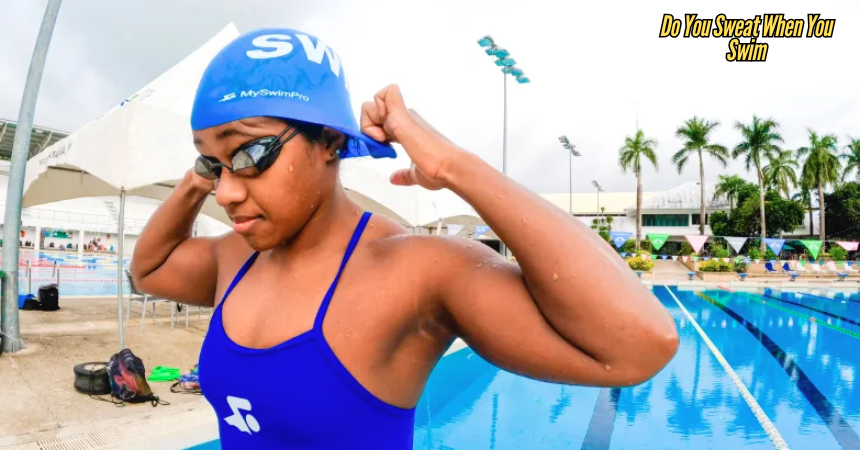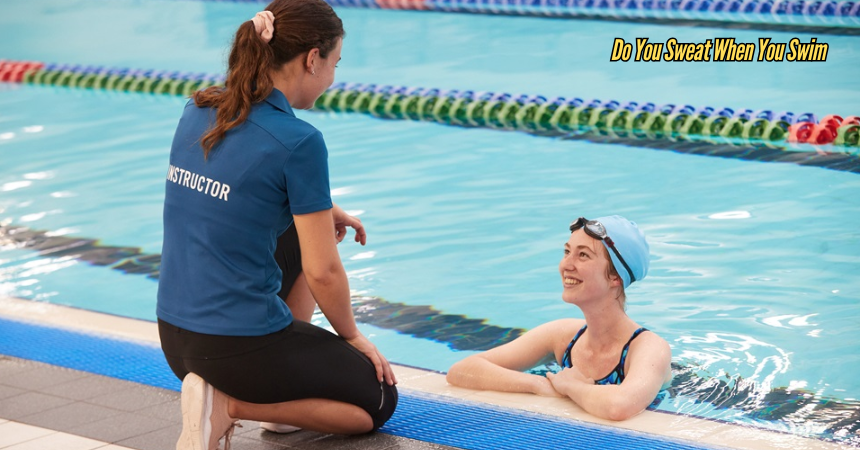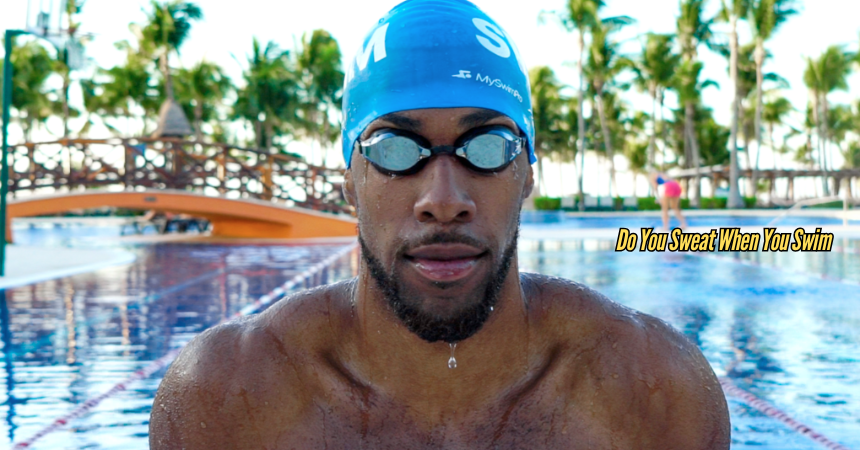Do you sweat when you swim- Swimming often seems like a “sweat-free” exercise, but that’s far from the truth. Many people assume that submerging in water means you won’t sweat, yet the opposite happens.
Sweating is a natural body process, even when you’re swimming. It’s your body’s way of cooling down after generating heat during physical activity.
Because water masks the sensation of sweat, it’s easy to overlook. Understanding this process is crucial for swimmers aiming to optimize performance.
It can also help in avoiding dehydration, a hidden risk in swimming. Sweating affects energy levels, endurance, and recovery.
By addressing this overlooked topic, swimmers can better manage hydration and maintain peak form. In this blog, I’ll explain the science of sweating while swimming and offer practical tips.
Do You Sweat When You Swim?
Yes, you do sweat when you swim. The body generates heat during physical activity. Swimming triggers the sweat glands to cool your body down.
Water hides the sweat, so it’s not visible. You may not feel it, but sweating still happens underwater. High-intensity swimming increases sweat production.

Cold water reduces it but doesn’t stop it. Sweating can lead to dehydration if ignored. I always drink water before and after swimming. Staying hydrated is key to avoiding fatigue and cramps. Swimming isn’t sweat-free, so manage your hydration properly.
Understanding Sweat And Its Purpose
Sweating is your body’s natural cooling system. When you exercise, your muscles generate heat, raising your body temperature. Sweat glands release moisture to cool your skin as it evaporates.
Even in water, this cooling mechanism doesn’t shut down. Swimming causes exertion, leading to heat generation and, in turn, sweating.
Sweat isn’t visible because it mixes with water and doesn’t evaporate. However, the process still occurs inside your body. Sweat also helps eliminate toxins and maintain balance.
Its primary role is to regulate temperature, ensuring your body doesn’t overheat. Sweating is vital to exercise physiology, whether on land or in water.
Do You Sweat While Swimming?
Yes, you sweat while swimming, but it’s harder to notice. Water cools your skin, making sweat less obvious. When you swim, your body generates heat due to physical activity.
This heat triggers your sweat glands, even underwater. Cooler water might reduce the amount of sweat produced, but it doesn’t stop the process. High-intensity swimming leads to more sweating, as your body works harder to cool down.
Personal factors like fitness levels, water temperature, and swim duration also influence sweat production. Competitive swimmers or those training intensively are more likely to sweat heavily. While sweating is invisible in water, its effects on hydration remain. Swimming doesn’t exempt you from managing sweat-related challenges.
How Sweating Affects Swimmers
Sweating during swimming can cause dehydration if ignored. Dehydration affects energy, endurance, and mental focus. Swimmers often forget to hydrate, thinking water keeps them replenished.

However, sweat loss still occurs, even in pools. Dehydration can lead to cramps, fatigue, or slower recovery post-swim. Long-distance swimmers or those training in heated pools are at greater risk.
Proper hydration is essential to replace lost fluids and electrolytes. Ignoring sweat’s impact can harm your overall performance. Signs of dehydration include dizziness, dry mouth, or fatigue. Monitoring hydration levels before and after swimming is critical to avoid complications.
Tips For Managing Sweating And Hydration In Swimming
Hydration starts before you even enter the pool. Drink water 30 minutes before swimming to prep your body. During breaks, sip water or an electrolyte drink to stay balanced.
Avoid sugary or caffeinated drinks that can dehydrate you. For long swim sessions, consider electrolyte tablets or sports drinks. After swimming, rehydrate immediately to restore lost fluids.

Check for signs of dehydration like dark urine or excessive fatigue. Set reminders to drink water if you often forget. Wearing lighter swimwear can help your body cool more efficiently. Staying consistent with hydration ensures better swimming performance and recovery.
Fun Facts And Myths About Sweating In Water
Many believe swimming doesn’t cause sweating, but that’s a myth. You sweat just as much—or more—during high-intensity swims. Cold water doesn’t stop sweating; it only reduces visible effects.
Sweat mixes with water, making it harder to detect. Professional swimmers lose significant fluids during training sessions. Sweating in saltwater pools can cause a slight salty taste on your lips.
Heat waves or heated pools amplify sweating during swims. Sweat doesn’t always mean overheating; it’s your body staying efficient. Swimmers often mistake fatigue for dehydration caused by sweating. Knowing these facts can enhance your swim routine and health awareness.
FAQ
Can you sweat underwater while swimming?
Yes, your body produces sweat to regulate heat even while submerged.
How do I know if I’m sweating during a swim?
It’s hard to notice since sweat mixes with water, but thirst and fatigue are clues.
Does swimming in cold water stop sweating?
No, it only reduces visible signs, as your body still generates heat.
How much water should I drink when swimming?
Hydrate 30 minutes before, sip during breaks and drink after to restore balance.
Is sweating in water harmful?
It’s natural but can cause dehydration if fluids aren’t replenished.
Conclusion
Sweating during swimming is a reality many overlook. The body’s cooling system remains active, even underwater. While sweat is invisible, its effects on hydration and performance are undeniable.
Staying hydrated is vital to avoid energy dips and dehydration risks. Incorporating hydration practices can elevate your swimming game. Remember, being in water doesn’t mean your body isn’t working hard.
Whether you’re a casual swimmer or a competitive athlete, sweat management is essential. Take control of your hydration for better endurance and recovery.
By understanding sweat’s role, you can swim smarter and healthier. Embrace the science and let it guide your swimming journey.